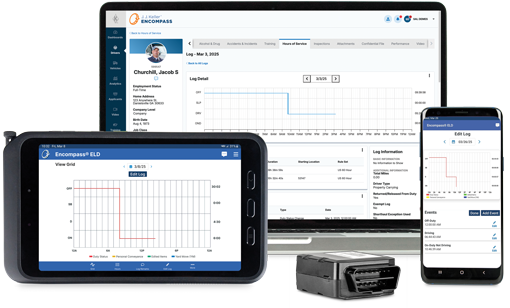Industry Business Advisor — J. J. Keller & Associates, Inc.
Do I Have to Audit My Drivers' Hours-of-Service Logs?
Showing that you have adequate controls in place for hours of service requires exceptional documentation and recordkeeping.
Published On: 05/10/2024
This article was originally published in 2022, and updated in 2024.


Written by:
Rick Malchow
The short answer is yes — to mitigate risk and fines from violations.
However, you won’t find “You must audit your driver’s logs” in the Federal Motor Carrier Safety Regulations (FMCSRs). What you will find, and what you need to comply with, is found in 49 CFR Part 385.5 — carriers must have adequate safety management controls in place to reduce the risk associated with the use of fatigued drivers. To state it simply, auditing your drivers’ hours-of-service logs (electronic or paper and short-haul drivers' time records) is a demonstration of the required safety management controls.
The explanation of these controls can be found in Part 385.3, but is stated, in part, here:
“Safety management controls means the systems, policies, programs, practices, and procedures used by a motor carrier to ensure compliance with applicable safety … regulations which ensure the safe movement of products and passengers through the transportation system, and to reduce the risk of highway accidents … resulting in fatalities, injuries, and property damage.”
Showing that you have adequate controls in place for hours of service requires exceptional documentation and recordkeeping, not only your drivers’ time records but also supporting documents as required in Part 395.11. These rules apply to drivers who use paper or electronic logs and is a best practice for short-haul drivers' time records. The section limits the number and type of documents you need to keep, but the point is to use the documents to find and correct falsification.
Who Has to Audit Driver Logs?
So, knowing you must audit your drivers’ logs, we should start with the question, “Who has to comply with the hours-of-service (HOS) rules?” The answer begins with defining a commercial motor vehicle (CMV), including where and how you’re using such a vehicle. If you don’t have any CMVs that meet state or federal definitions, then you’re exempt from the hours of service and other DOT safety rules.
At the federal level, you’re subject to the rules if your vehicles are involved in interstate commerce — generally meaning what or who is in the vehicle has crossed state borders — and the vehicles are operating on a highway (any public or private roadway) that is open to public travel.
The next criteria for complying with HOS rules relates to the size of the vehicle:
- If either the actual weight or the manufacturer’s rated weight of the single or combination vehicle is 10,001 pounds or more, then it’s a regulated CMV (that could include, for example, an F-150 pickup truck with a trailer);
- If transporting placardable hazardous materials; or,
- For passenger-carrying vehicles -- if the vehicle is designed or used to transport 9 or more passengers (including the driver) for compensation, OR 16 or more passengers regardless of compensation, then it’s a regulated CMV.
DOT Driver Supporting Documents
Carriers must retain five high-level types of supporting documents that are generated or received through the ordinary course of business. The document types are:
- Bills of lading, itineraries, schedules, or equivalent documents that show the origin and destination of each trip;
- Dispatch records, trip records, or equivalent documents;
- Expense receipts (for meals, lodging, fuel, etc.);
- Fleet management system communication records; and
- Payroll records, settlement sheets, or equivalent documents showing payment to a driver.
These records must contain the driver’s name or ID#, date, location, and time.
You need to keep a maximum of eight supporting documents each day for each driver. Documents must be kept in a usable way, meaning an auditor must be able to match them to the drivers’ logs. And the documents still need to be submitted by the driver to the carrier within 13 days, just like the logs. The supporting documents must be retained for at least six months, as must the logs.
Supporting Documents and the Short-Haul, Exempt Driver
It’s worth mentioning that the supporting document requirements do not apply to drivers using a short-haul exception from logs or for HOS-exempt drivers. Does that mean that carriers with short-haul or exempt drivers still need to worry about supporting documents? The answer is YES!
Carriers with exempt drivers still need to worry about supporting documents because supporting documents should be a part of every carrier’s safety management controls. You can bet that these documents will be used by enforcement — and a plaintiff’s attorney — to determine if the driver was able to take the exemption.
For more educational tips, check out these resources:
- Log Auditing Checklists — Download our log auditing checklists for paper logs, ELDs, and short-haul records.
- Auditing Your Short-Haul Logging Records — A 3-step process for discovering non-compliance events in short-haul logging records.
- Are You Exempt from ELDs? — It’s a question our editors get a lot.
The J. J. Keller® Encompass® Fleet Management System provides log auditing compliance for carriers with regulated, non-CMV, and exempt drivers. Talk with a compliance specialist about how Encompass can help you improve your hours-of-service compliance.
Hear from Our Experts!
Watch this episode of the DOT & ELD Regulatory Minute for guidance from J. J. Keller regulatory experts. Subscribe to our YouTube channel for the latest compliance & safety insights!
You may also enjoy the following articles:
Sign up for our newsletter!
We'll help you stay on top of regulations, best practices, and fleet industry news. Sign up to receive a monthly email notification with links to our most recent blog articles, free resources, and event invites.
